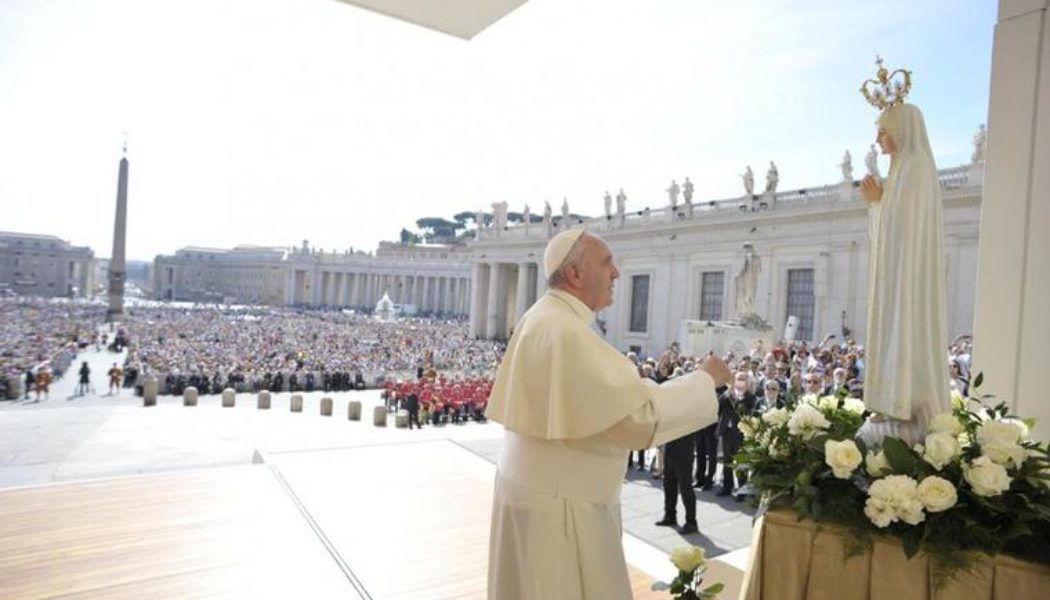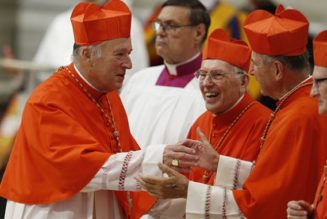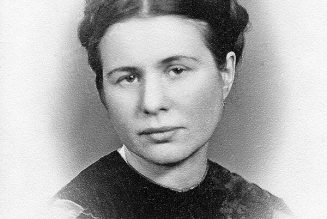
Why now?
Why 105 years after the Fatima apparitions, and 93 years after Sister Lucia had the message from Our Lady confirmed in 1929, is the Holy Father explicitly consecrating Russia to the Immaculate Heart of Mary, in union with the bishops of the world?
The war is the reason, and not just the fighting in Ukraine.
Kyiv is still standing but Kirill of Moscow has already fallen.
The Holy See released Wednesday the text of the Act of Consecration, to be made by Pope Francis in Rome on the Feast of the Annunciation and by his envoy, Cardinal Konrad Krajewksi, in Fatima at the same time. It will truly be universal — translations were issued in Tigrinya, the major language of Eritrea, and Malayalam, the language of the ancient St. Thomas Christians of Kerala.
The relevant part reads: “To your Immaculate Heart we solemnly entrust and consecrate ourselves, the Church and all humanity, especially Russia and Ukraine.”
Since 1929, the Roman Pontiffs have repeatedly made consecrations to the Immaculate Heart, and the 1984 consecration by St. John Paul II was judged by Sister Lucia to have fulfilled the request made by Our Lady of Fatima.
However, this time is different. Russia is explicitly mentioned, and all the bishops have been asked, as well as parish priests, to unite themselves to the Holy Father’s act.
The request to Sister Lucia, the sole surviving Fatima visionary by 1929, specified the explicit consecration of Russia, so “that Russia would convert” and peace would be achieved.
Yet even in 1984, St. John Paul II did not, in advance or in his official text, mention Russia. It was said that he did so when making the actual consecration.
The Vatican was reluctant to be so explicit for two reasons.
One was to avoid inflaming any superstitious sentiments which seemed to regard the consecration as akin to a shamanic incantation, or as a pious but perverse practice, like burying a statue of St. Joseph upside down in order to sell a property.
The other reason was Russian Orthodox sensitivities.
Russia is the de facto home of global Orthodoxy. The Catholic Church recognizes the Orthodox as valid sister Churches with an authentic episcopate and sacraments, not to mention an immense spiritual, theological and liturgical patrimony which dates to the first Christian centuries.
If the eastern “lung” of the Church is the Greek Orthodox tradition, its modern tongue is often Russian.
Therefore an act by the pope, one of whose titles is Patriarch of the West (thought Benedict XVI declined to use it), to consecrate Russia so “that she might convert,” could easily be badly received. Convert from what? To Catholicism?
While the “conversion of Russia” was widely thought in the West to refer to communism — the peaceful dismantling of which followed in short order after the 1984 consecration — it would not be unreasonable for Russian Orthodoxy to have concerns.
After all, what if an Orthodox patriarch were, in response to a Marian apparition, to consecrate Italy to Mary’s heart, that it might convert? What might Catholics and the Bishop of Rome think?
Given Russian Orthodox sensitivities, Rome proceeded with subtlety and discretion.
And now? Friday’s consecration is not only momentous in itself as a spiritual act, not only momentous in its most immediate goal, which is peace, but momentous in what it follows, namely the fall of Kirill.
The Patriarch of Moscow, a man of great culture who has been deeply compromised by both Soviet and Russian state power, has, in a few short weeks, ceased to be a religious authority worthy of respect. He is now widely viewed to be personally corrupted by power, more Putin’s propagandist than a pastor whose flock — by his own self-understanding — includes Ukrainians.
In less than the space of a month Pope Francis received the request for an explicit consecration, acceded to it, announced it and invited the entire Church to participate in it. Such an ecclesial earthquake is of historic proportions.
The religious landscape of the 21st century has shifted significantly. The Moscow Patriarchate — which styles itself the “Third Rome” — is no longer granted the respect, esteem and influence that was once routinely the case. Pending its purification of Putinism, and state cooptation more generally, Russian Orthodoxy is no longer a credible ecumenical partner.
That will have ramifications in Russia, where Russian Orthodoxy may finally be in the crisis which forces it to free itself from the straitjacket imposed by Stalin in 1941. It will have ramifications in global Orthodoxy, where Russia’s outsize influence (half of all Orthodox believers are Russian) will now radically diminish. And it has already had ramifications in Rome, where Kirill’s concerns are simply not deemed worthy of consideration at this time.
Patriarch Kirill himself knows this. For generations, the Rome-Moscow dance has followed a well-worn pattern. Rome would take an initiative; Moscow would react with outrage.
In 1988, John Paul wished to commemorate the millennium of the baptism of Kievan Rus’; Patriarch Pimen of Moscow made it clear that he was not welcome. (John Paul showed his esteem for his brother Slavs to the east by sending a delegation to Moscow which included the cardinal secretary of state, as well as the cardinal archbishops of Vienna, Warsaw, Munich, Milan, New York, Riga and Hanoi.)
In 1991, John Paul would announce “apostolic administrations” for the pastoral care of Catholics in Russia, and Patriarch Aleksy reacted with cold fury.
John Paul would offer to return to Russia their most holy icon, the Madonna of Kazan, spirited out of Russia for safekeeping and which surfaced in France before making its way to the Vatican. Russia would shrug its shoulders and told the Holy Father that he could send it if he wished, but he was not welcome. In 2004, he sent it anyway.
This time? Not a peep from Kirill denouncing the “spiritual imperialism” of Rome and other such conjured outrages. Spiritual imperialism is hard to decry when you are blessing imperialism of the old-fashioned martial kind.
The scandal of Kirill will prove an obstacle to the gospel and has inflicted a grave wound on global Christianity, as all counter-witness does. Yet from biblical times onwards God often uses the scandal of sin and its consequences to purify His people.
Prayers for Russia today thus include the purification of the Moscow patriarchate, so that Russia may again offer the spiritual gifts without which the Church universal is not fully complete.
Join Our Telegram Group : Salvation & Prosperity








